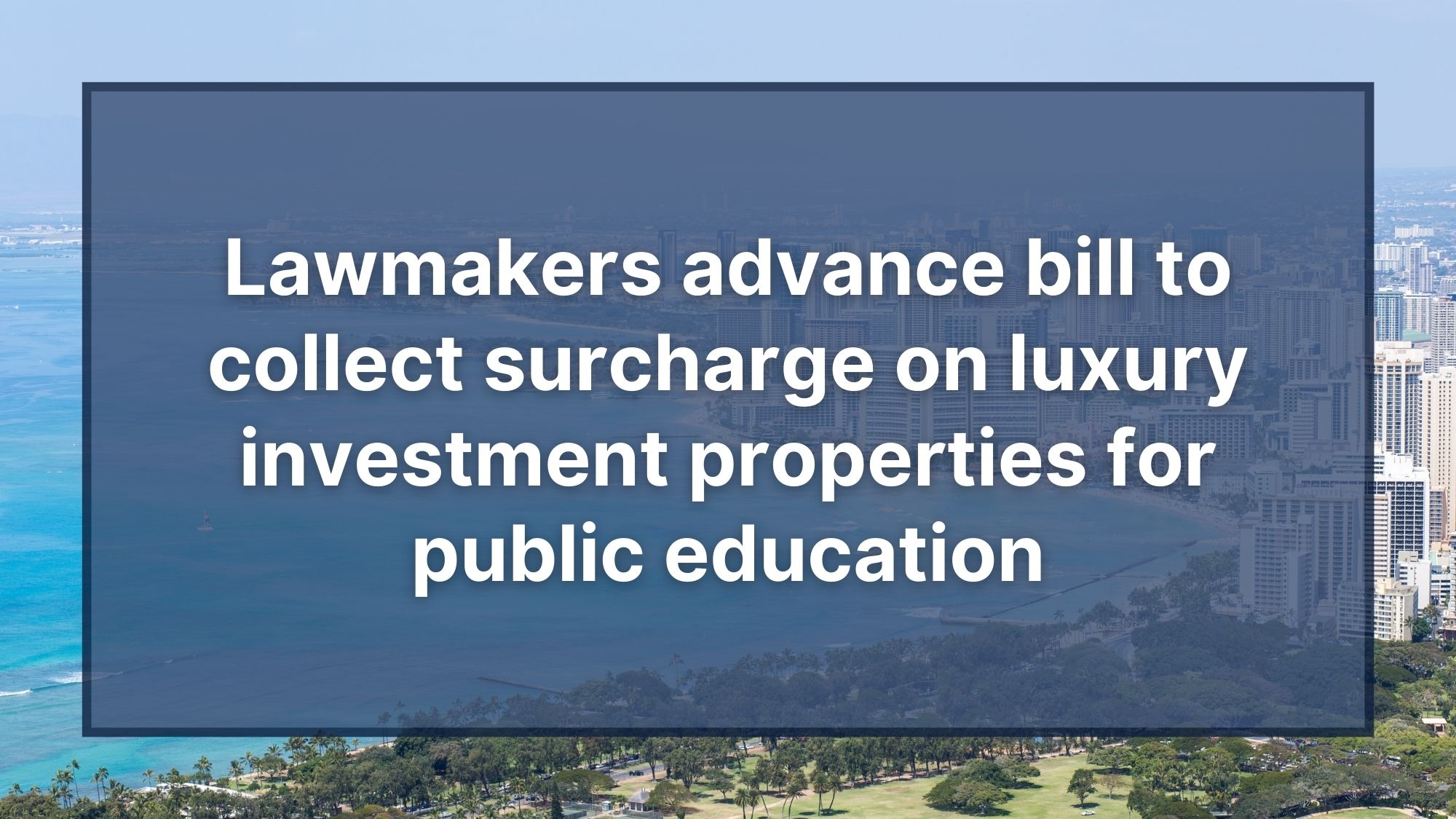HSTA president says ‘educating our keiki is everyone’s kuleana’
Posted: February 8, 2024
A bill that would give the public the chance to amend Hawaiʻi’s constitution to collect a new property tax on pricey investment properties in the islands for public education is advancing in the state Legislature.
House Bill 1537, HD1 would begin the process of creating a surcharge on residential investment property valued at $3 million or greater to fund public education.
If the bill is approved this legislative session, Hawaiʻi voters would see a question on the general election ballot in November. The question currently proposed reads: “Shall the legislature increase funding for public education for all of Hawaii’s children and adults by establishing, as provided by law, a surcharge on residential investment property valued at $3,000,000 or greater, excluding a homeowner’s primary residence?”
The bill passed a second reading by the full House of Representatives Monday with four no votes and one aye with reservations. It was approved with amendments by the House Committee on Judiciary and Hawaiian Affairs Thursday afternoon.
The Hawaiʻi State Teachers Association supports the bill to alleviate the chronic underfunding of Hawaiʻi’s public education and support children of families struggling with Hawaiʻi’s high cost of living. State officials estimate the surcharge would bring in roughly $40 to $60 million a year in funding for public schools.
HSTA President Osa Tui, Jr. said, “Increasingly Hawai’i is becoming the playground for the mega-wealthy. It is unconscionable that as they harvest the benefits and splendors that these lands offer, they don’t also give back to our schools which are falling apart and not providing our keiki with the schools they deserve.”
Rep. Della Au Bellati voted in strong support. “This measure is going to affect the wealthy, the uber-wealthy that are purchasing for the price of paradise, properties that are over millions of dollars. Not our local family. Not our local people,” she said.
The lawmaker, who represents Makiki and Punchbowl, said she and her husband “scrimped and saved for over 15 years to buy a little piece of air in the sky that is valued under $600,000.” Meanwhile, she pointed out, an unnamed wealthy buyer recently purchased a penthouse condominium in Honolulu for $27.5 million.
Au Bellati said, “So if this is a measure that can be crafted and properly get at these unnamed wealthy buyers purchasing penthouses for over $27.5 million, yes. Let’s do that. Let’s consider that as an option for our public school students, for our public school teachers, for our public work employees, who, day in and day out, work to make the ALICE wages (the threshold necessary to afford basics of living, such as housing, health and child care, food, and transportation) that they are desperately trying to make so they can afford a little piece of pie in the sky.”
Change would result in county-level support for education
Currently Hawaiʻi’s counties have the exclusive power to collect property tax, and this money does not go toward education, which the state funds.
Tui, president of the teachers’ union, said, “Educating our keiki is everyone’s kuleana. While the counties may feel this is taking from pots of money that should be exclusive to them, that ignores the fact that the state has to support the counties in numerous ways as well. We cannot remain siloed when it comes to investing in the future of Hawaiʻi — the keiki o ka ʻāina.”
Rep. Amy Perruso, majority whip and chair of the House Committee on Higher Education and Technology, pointed out that the state and counties already share tax revenue.
“It’s my understanding that counties enjoy access to GET (general excise tax) funds, TAT (transient accommodations tax) funds. So we are already sharing in these revenue-generating mechanisms, and this provides us another way to actually address this question of speculation in the islands by folks who, for the most part the data shows, primarily do not live here,” said Perruso, a former Mililani High teacher who currently represents a portion of Waipi‘o Acres, Launani Valley, Wahiawā, Whitmore Village, Waialua, and Mokulē‘ia.
Tui said, “Ultimately, this would put the decision on whether our keiki are worthy of such investment in the hands of the voters of this state.”
In 2018, the Hawaiʻi Supreme Court invalidated a question on general election ballots asking voters if they want to amend the Hawaiʻi Constitution to allow the state to tax property in support of public education.
Ruling in favor of Hawaiʻi’s four counties, the court found that the wording of the question wasn’t sufficiently clear. Hawaiʻi law requires that the language of a constitutional amendment be “neither misleading or deceptive.”

